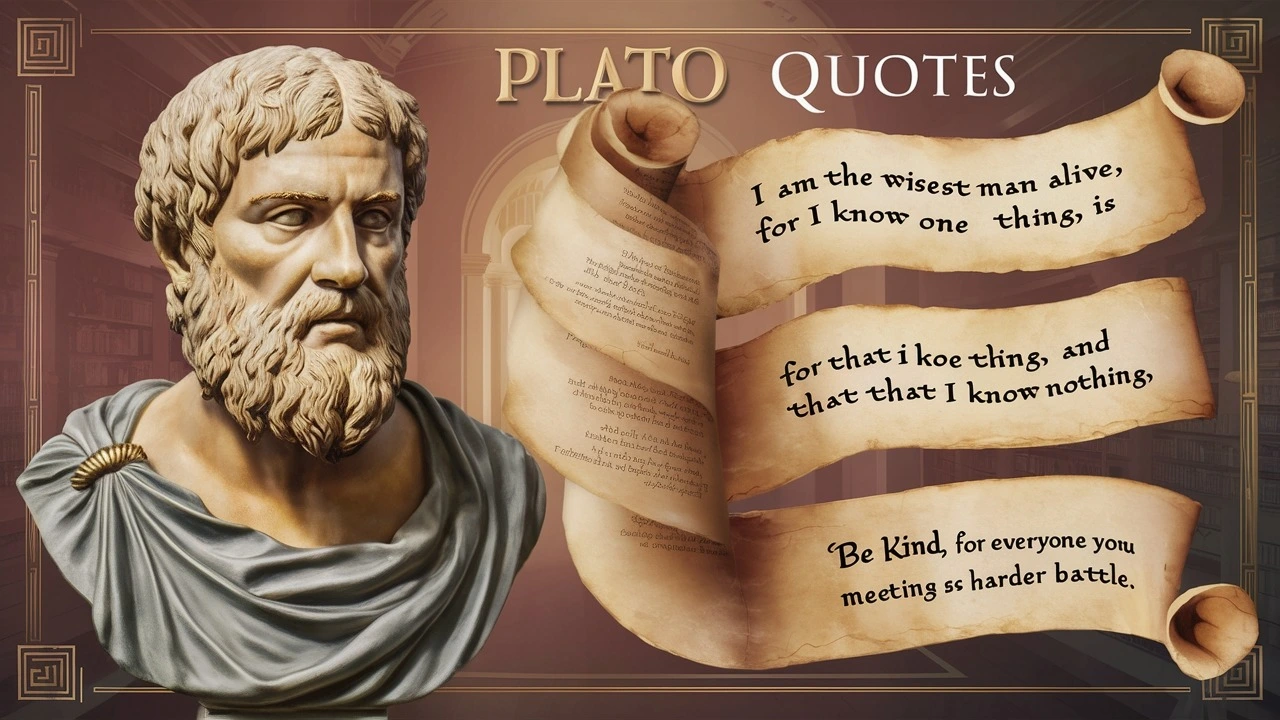In this blog post, we explore some of Plato Quotes, organized into different themes, each accompanied by a brief description to help you understand the depth and context of his wisdom.
Plato, one of the most influential philosophers in Western history, has left a legacy of thought-provoking ideas that continue to inspire and challenge minds today. His works touch on a variety of subjects, including ethics, politics, love, and the nature of reality.
The Nature of Reality
“Reality is created by the mind; we can change our reality by changing our mind.”
Author: Plato
Description:
Plato emphasizes the power of the human mind in shaping our perception of reality. By changing our thoughts, we can alter our experiences and our world.
“The world of our senses is a world of shadows, Plato believed.”
Author: Plato
Description:
This quote reflects Plato’s theory of forms, where the physical world is seen as a mere shadow of a higher, more real world of forms or ideas.
“We can easily forgive a child who is afraid of the dark; the real tragedy of life is when men are afraid of the light.”
Author: Plato
Description:
Plato speaks to the fear of truth and enlightenment. While fear of the unknown is natural, avoiding the truth is the real tragedy.
“The only real ill is ignorance, Plato maintained.”
Author: Plato
Description:
Ignorance is seen as the root of all evil in Plato’s philosophy. Knowledge and wisdom are the keys to a virtuous life.
“Plato’s cave allegory suggests that the world we see is just a shadow of reality.”
Author: Plato
Description:
The Allegory of the Cave is one of Plato’s most famous metaphors, illustrating the difference between the world of appearances and the world of reality.
“All is flux, nothing stays still.”
Author: Plato
Description:
Plato discusses the ever-changing nature of the physical world, where everything is in constant motion and nothing remains the same.
“The unexamined life is not worth living.”
Author: Plato
Description:
Plato urges individuals to reflect on their lives, suggesting that without self-examination and philosophical inquiry, life lacks true meaning.
“Knowledge is the food of the soul.”
Author: Plato
Description:
Plato equates knowledge with nourishment for the soul, implying that learning and wisdom are essential for a fulfilling life.
“Philosophy begins in wonder.”
Author: Plato
Description:
Plato sees philosophy as starting with a sense of wonder and curiosity about the world, leading to deeper understanding and insight.
“The soul takes nothing with her to the next world but her education and culture.”
Author: Plato
Description:
Plato emphasizes the importance of intellectual and moral development, as these are the only things we carry with us beyond this life.
Ethics and Virtue
“Justice means minding your own business and not meddling with other men’s concerns.”
Author: Plato
Description:
Plato defines justice as the harmonious functioning of society where everyone does their part without interfering in others’ roles.
“Courage is knowing what not to fear.”
Author: Plato
Description:
Plato’s understanding of courage involves discernment—understanding what is truly worth fearing and what is not.
“The greatest wealth is to live content with little.”
Author: Plato
Description:
Plato suggests that true wealth lies in contentment and simplicity, rather than in material possessions.
“Good actions give strength to ourselves and inspire good actions in others.”
Author: Plato
Description:
Plato believes that virtuous actions not only strengthen the individual but also encourage others to act virtuously.
“Virtue is a kind of health, beauty, and good habit of the soul.”
Author: Plato
Description:
Plato compares virtue to health and beauty, suggesting that it is a state of well-being and moral excellence.
“Ignorance, the root and stem of every evil.”
Author: Plato
Description:
Plato identifies ignorance as the source of all wrongdoing, emphasizing the importance of knowledge and education in achieving virtue.
“The first and greatest victory is to conquer yourself.”
Author: Plato
Description:
Plato highlights the importance of self-control and mastery over one’s desires as the foundation of true virtue.
“Justice in the life and conduct of the State is possible only as first it resides in the hearts and souls of the citizens.”
Author: Plato
Description:
Plato asserts that societal justice begins with the individual’s moral integrity, implying that a just society is composed of just individuals.
“He who commits injustice is ever made more wretched than he who suffers it.”
Author: Plato
Description:
Plato argues that committing injustice harms the perpetrator more than the victim, as it corrupts the soul and leads to a life of misery.
“A good decision is based on knowledge and not on numbers.”
Author: Plato
Description:
Plato values wisdom and informed decision-making over popularity or majority rule, emphasizing the importance of knowledge in governance.
Love and Relationships
“Love is a serious mental disease.”
Author: Plato
Description:
Plato humorously describes love as a form of madness, highlighting its intense and often irrational nature.
“At the touch of love, everyone becomes a poet.”
Author: Plato
Description:
Plato observes that love inspires creativity and expression, turning even the most ordinary person into a poet.
“Love is the pursuit of the whole.”
Author: Plato
Description:
Plato views love as the desire for completeness and unity, a search for the missing half that makes us whole.
“The madness of love is the greatest of heaven’s blessings.”
Author: Plato
Description:
Plato suggests that the passionate and irrational nature of love is a divine gift, bringing great joy and fulfillment.
“True love is born from understanding.”
Author: Plato
Description:
Plato emphasizes that genuine love is rooted in a deep understanding and empathy between individuals.
“Love is simply the name for the desire and pursuit of the whole.”
Author: Plato
Description:
For Plato, love is the drive towards completeness, a yearning for unity and connection with another.
“A lover’s soul lives in the body of their beloved.”
Author: Plato
Description:
Plato metaphorically describes the deep connection between lovers, where their souls become intertwined.
“The soul of the lover and the beloved inhabit the same world.”
Author: Plato
Description:
This quote reflects Plato’s belief in the spiritual connection between lovers, who share a deep, metaphysical bond.
“There is a type of love that seeks beauty not of body, but of soul.”
Author: Plato
Description:
Plato distinguishes between physical attraction and a deeper love that values the beauty of the soul.
“Love is a ladder to the divine.”
Author: Plato
Description:
Plato sees love as a path to spiritual elevation, leading the soul closer to the divine through the appreciation of beauty.
Politics and Society
“The price of apathy towards public affairs is to be ruled by evil men.”
Author: Plato
Description:
Plato warns that indifference to politics can lead to the rise of corrupt leaders, emphasizing the importance of civic engagement.
“Democracy is a charming form of government, full of variety and disorder, and dispensing a sort of equality to equals and unequal alike.”
Author: Plato
Description:
Plato critiques democracy for its tendency to create disorder and treat people of different abilities as equals.
“The heaviest penalty for declining to rule is to be ruled by someone inferior to yourself.”
Author: Plato
Description:
Plato points out the consequences of avoiding leadership, suggesting that those who are capable must take responsibility, or else be governed by less qualified individuals.
“No one is more hated than he who speaks the truth.”
Author: Plato
Description:
Plato highlights the challenges faced by truth-tellers in society, who often provoke hostility for challenging the status quo.
“There will be no end to the troubles of states, or of humanity itself, till philosophers become kings.”
Author: Plato
Description:
Plato advocates for the rule of philosopher-kings, believing that only those who possess wisdom and virtue should govern.
“When there is an income tax, the just man will pay more and the unjust less on the same amount of income.”
Author: Plato
Description:
Plato discusses the inherent unfairness in systems of taxation, where the just person bears a heavier burden than the unjust.
“The measure of a man is what he does with power.”
Author: Plato
Description:
Plato believes that true character is revealed by how one wields power, with the just using it wisely and the corrupt abusing it.
“The beginning is the most important part of the work.”
Author: Plato
Description:
Plato emphasizes the significance of laying a strong foundation, particularly in politics and governance, where the initial steps set the course for future success.
“Dictatorship naturally arises out of democracy, and the most aggravated form of tyranny and slavery out of the most extreme liberty.”
Author: Plato
Description:
Plato warns that excessive freedom in a democracy can lead to chaos, ultimately resulting in the rise of tyranny.
“Justice means minding your own business and not meddling with other men’s concerns.”
Author: Plato
Description:
Plato reiterates his definition of justice, applying it to the governance of society, where each person should focus on their role without interfering in others’ affairs.
Education and Knowledge
“Knowledge which is acquired under compulsion obtains no hold on the mind.”
Author: Plato
Description:
Plato believes that true learning cannot be forced; it must be pursued willingly to have a lasting impact.
“The direction in which education starts a man will determine his future in life.”
Author: Plato
Description:
Plato emphasizes the importance of early education in shaping a person’s character and future success.
“Do not train a child to learn by force or harshness, but direct them to it by what amuses their minds.”
Author: Plato
Description:
Plato advocates for a gentle, engaging approach to education, encouraging children to learn through activities that interest them.
“Education is teaching our children to desire the right things.”
Author: Plato
Description:
Plato views education as not just the transmission of knowledge, but also the cultivation of good desires and values.
“The object of education is to teach us to love what is beautiful.”
Author: Plato
Description:
Plato believes that education should inspire a love for beauty, which he associates with truth and goodness.
“The highest form of knowledge is empathy, for it requires us to suspend our egos and live in another’s world.”
Author: Plato
Description:
Plato stresses the importance of empathy as a form of knowledge that transcends self-interest and deepens understanding of others.
“No one is more hated than he who speaks the truth.”
Author: Plato
Description:
Plato discusses the challenges faced by those who pursue and speak the truth, particularly in an educational context where truth can be unsettling.
“There is no learning without remembering.”
Author: Plato
Description:
Plato highlights the role of memory in the learning process, suggesting that knowledge is often a recollection of previously understood truths.
“The soul takes nothing with her to the next world but her education and culture.”
Author: Plato
Description:
Plato reiterates the importance of intellectual and moral development as the only things of true value that endure beyond this life.
“Knowledge is the food of the soul.”
Author: Plato
Description:
Plato once again compares knowledge to nourishment, underscoring its essential role in the growth and well-being of the soul.
The Soul and Immortality
“The soul is eternal and immortal.”
Author: Plato
Description:
Plato believes in the immortality of the soul, asserting that it exists beyond the physical body and endures forever.
“The body is the prison of the soul.”
Author: Plato
Description:
Plato describes the body as a temporary confinement for the soul, which yearns to return to the realm of forms.
“The soul of man is immortal and imperishable.”
Author: Plato
Description:
Plato emphasizes the soul’s eternal nature, suggesting that it cannot be destroyed and lives on after death.
“The soul takes nothing with her to the next world but her education and culture.”
Author: Plato
Description:
Plato underscores the importance of spiritual and intellectual development, which are the only things we carry with us beyond this life.
“The soul is the source of all life.”
Author: Plato
Description:
Plato sees the soul as the fundamental principle of life, giving vitality to the body and mind.
“The soul is like a charioteer with two horses, reason and passion.”
Author: Plato
Description:
In this metaphor, Plato illustrates the conflict within the soul, where reason must guide passion to achieve balance and harmony.
“The soul’s journey is one of ascent, moving closer to the divine.”
Author: Plato
Description:
Plato views the soul’s purpose as a journey toward higher understanding and unity with the divine.
“The soul is nourished by learning.”
Author: Plato
Description:
Plato equates learning with nourishment for the soul, emphasizing the importance of knowledge in spiritual growth.
“The soul is the true self, not the body.”
Author: Plato
Description:
Plato distinguishes the soul as the essence of a person, with the body serving as a temporary vessel.
“The soul has wings and can soar to great heights.”
Author: Plato
Description:
Plato metaphorically describes the soul’s potential to rise above earthly concerns and reach higher realms of understanding and existence.
Friendship and Human Connections
“Friendship is a single soul dwelling in two bodies.”
Author: Plato
Description:
Plato describes the deep connection between friends, who share a unified sense of understanding and purpose.
“True friendship can exist only between equals.”
Author: Plato
Description:
Plato suggests that genuine friendship requires mutual respect and equality between individuals.
“There is no greater joy than to have an intelligent friend.”
Author: Plato
Description:
Plato values the companionship of an intelligent friend, who can offer wisdom, understanding, and meaningful conversation.
“A friend to all is a friend to none.”
Author: Plato
Description:
Plato cautions against superficial friendships, implying that true friendship requires depth and exclusivity.
“Friendship is the sharing of everything, good and bad.”
Author: Plato
Description:
Plato sees friendship as a bond where friends share all aspects of life, supporting each other through both joy and hardship.
“Friends are the siblings the gods never gave us.”
Author: Plato
Description:
Plato describes friends as chosen family, offering a special kind of relationship that complements our natural ties.
“In the end, we will remember not the words of our enemies, but the silence of our friends.”
Author: Plato
Description:
Plato reflects on the importance of friendship and the deep impact of a friend’s support—or lack thereof—during difficult times.
“Friendship is the purest form of love.”
Author: Plato
Description:
Plato views friendship as a selfless and noble form of love, untainted by physical desire or selfish interests.
“There is nothing on this earth more to be prized than true friendship.”
Author: Plato
Description:
Plato places immense value on true friendship, considering it one of the greatest treasures life has to offer.
“Friends are companions on a journey, who ought to aid each other to persevere on the road to a happier life.”
Author: Plato
Description:
Plato sees friends as fellow travelers on the journey of life, helping each other overcome obstacles and achieve happiness.
Knowledge and Ignorance
“Ignorance, the root and stem of every evil.”
Author: Plato
Description:
Plato identifies ignorance as the fundamental cause of all wrongdoing, emphasizing the need for knowledge and wisdom.
“The only real ill is ignorance, Plato maintained.”
Author: Plato
Description:
Plato reiterates the idea that ignorance is the true evil in the world, and knowledge is the path to virtue and goodness.
“Knowledge is the food of the soul.”
Author: Plato
Description:
Plato again compares knowledge to nourishment, suggesting that the soul thrives on learning and understanding.
“The highest form of knowledge is empathy.”
Author: Plato
Description:
Plato values empathy as a deep form of knowledge that allows us to connect with others and understand their experiences.
“There is no learning without remembering.”
Author: Plato
Description:
Plato highlights the role of memory in the learning process, suggesting that true knowledge is often a recollection of forgotten truths.
“The direction in which education starts a man will determine his future in life.”
Author: Plato
Description:
Plato emphasizes the importance of early education in shaping a person’s character and future success.
“Do not train a child to learn by force or harshness, but direct them to it by what amuses their minds.”
Author: Plato
Description:
Plato advocates for a gentle, engaging approach to education, encouraging children to learn through activities that interest them.
“The object of education is to teach us to love what is beautiful.”
Author: Plato
Description:
Plato believes that education should inspire a love for beauty, which he associates with truth and goodness.
“Knowledge which is acquired under compulsion obtains no hold on the mind.”
Author: Plato
Description:
Plato argues that learning must be pursued willingly and with interest for it to be truly effective.
“The soul is nourished by learning.”
Author: Plato
Description:
Plato emphasizes the importance of continuous learning as essential nourishment for the soul.
The Ideal State
“There will be no end to the troubles of states, or of humanity itself, till philosophers become kings.”
Author: Plato
Description:
Plato advocates for the rule of philosopher-kings, believing that only those who possess wisdom and virtue should govern.
“Justice means minding your own business and not meddling with other men’s concerns.”
Author: Plato
Description:
Plato defines justice as the harmonious functioning of society where everyone does their part without interfering in others’ roles.
“The heaviest penalty for declining to rule is to be ruled by someone inferior to yourself.”
Author: Plato
Description:
Plato points out the consequences of avoiding leadership, suggesting that those who are capable must take responsibility, or else be governed by less qualified individuals.
“The price of apathy towards public affairs is to be ruled by evil men.”
Author: Plato
Description:
Plato warns that indifference to politics can lead to the rise of corrupt leaders, emphasizing the importance of civic engagement.
“Dictatorship naturally arises out of democracy, and the most aggravated form of tyranny and slavery out of the most extreme liberty.”
Author: Plato
Description:
Plato warns that excessive freedom in a democracy can lead to chaos, ultimately resulting in the rise of tyranny.
“Democracy is a charming form of government, full of variety and disorder, and dispensing a sort of equality to equals and unequal alike.”
Author: Plato
Description:
Plato critiques democracy for its tendency to create disorder and treat people of different abilities as equals.
“The measure of a man is what he does with power.”
Author: Plato
Description:
Plato believes that true character is revealed by how one wields power, with the just using it wisely and the corrupt abusing it.
“The beginning is the most important part of the work.”
Author: Plato
Description:
Plato emphasizes the significance of laying a strong foundation, particularly in politics and governance, where the initial steps set the course for future success.
“When there is an income tax, the just man will pay more and the unjust less on the same amount of income.”
Author: Plato
Description:
Plato discusses the inherent unfairness in systems of taxation, where the just person bears a heavier burden than the unjust.
“He who commits injustice is ever made more wretched than he who suffers it.”
Author: Plato
Description:
Plato argues that committing injustice harms the perpetrator more than the victim, as it corrupts the soul and leads to a life of misery.










